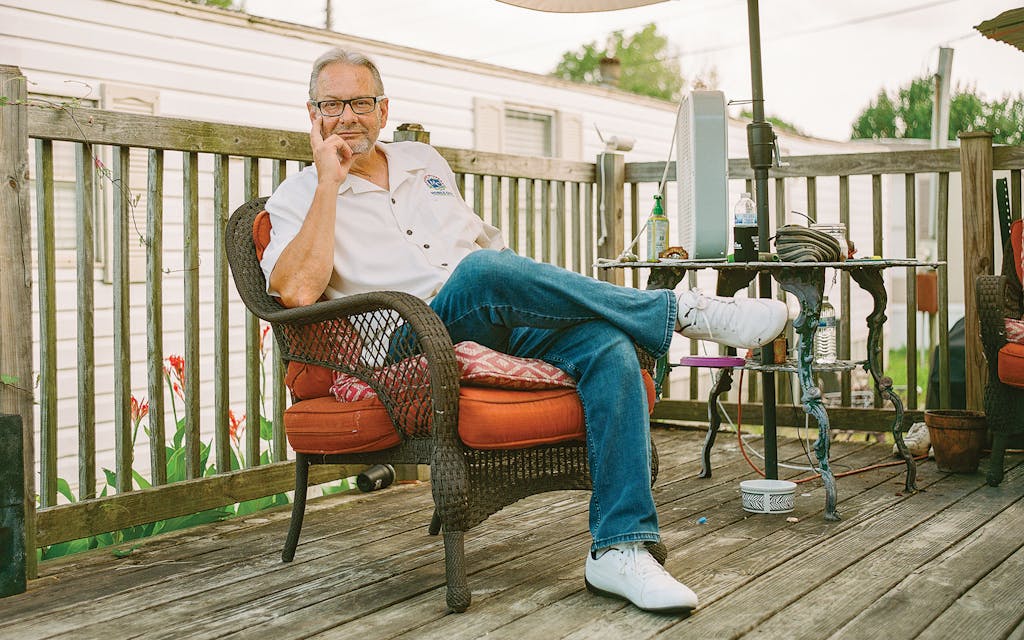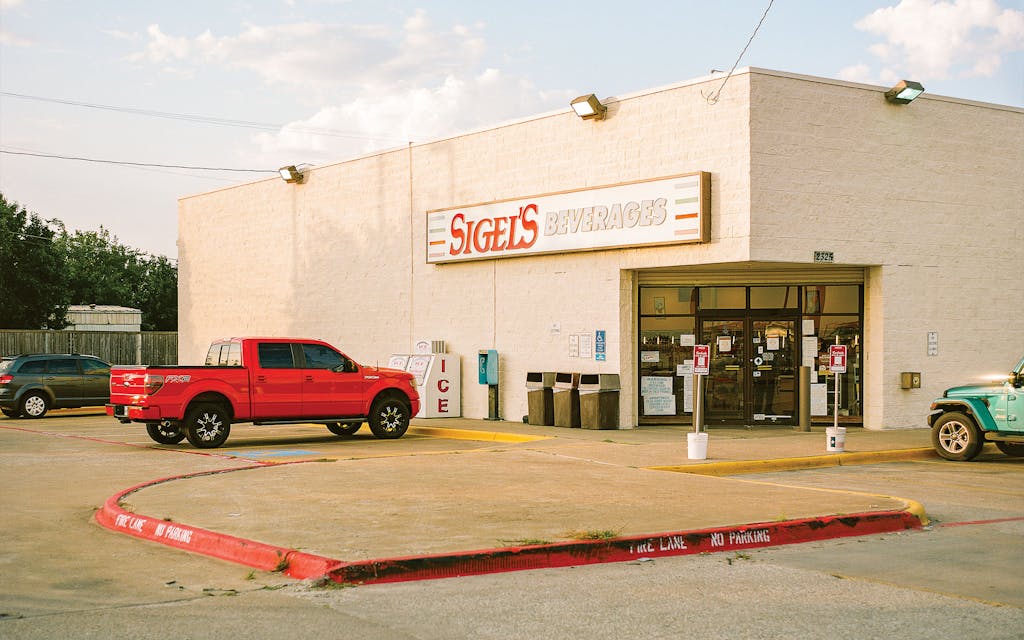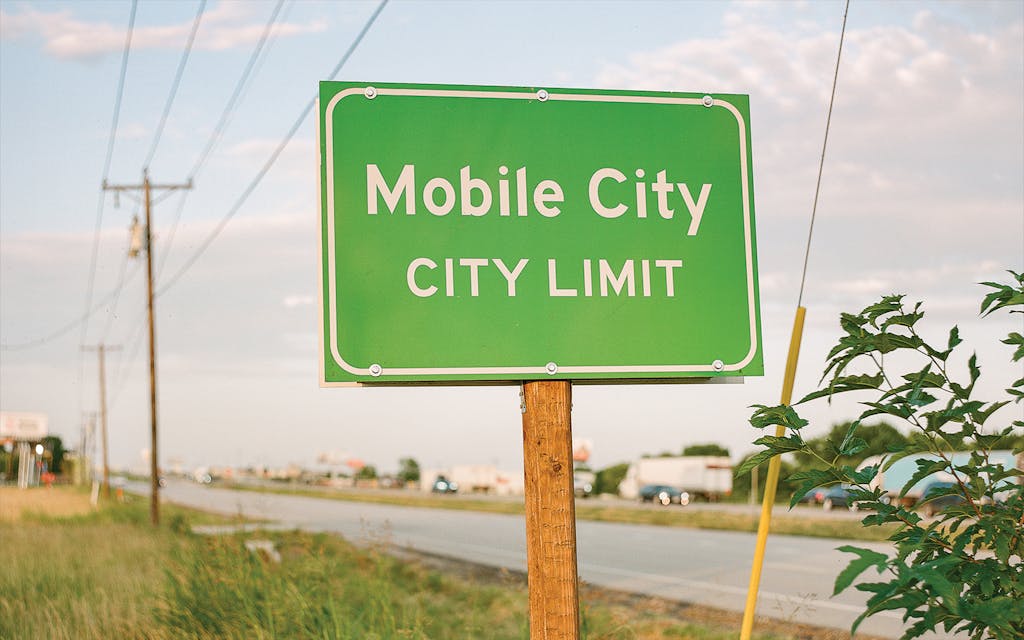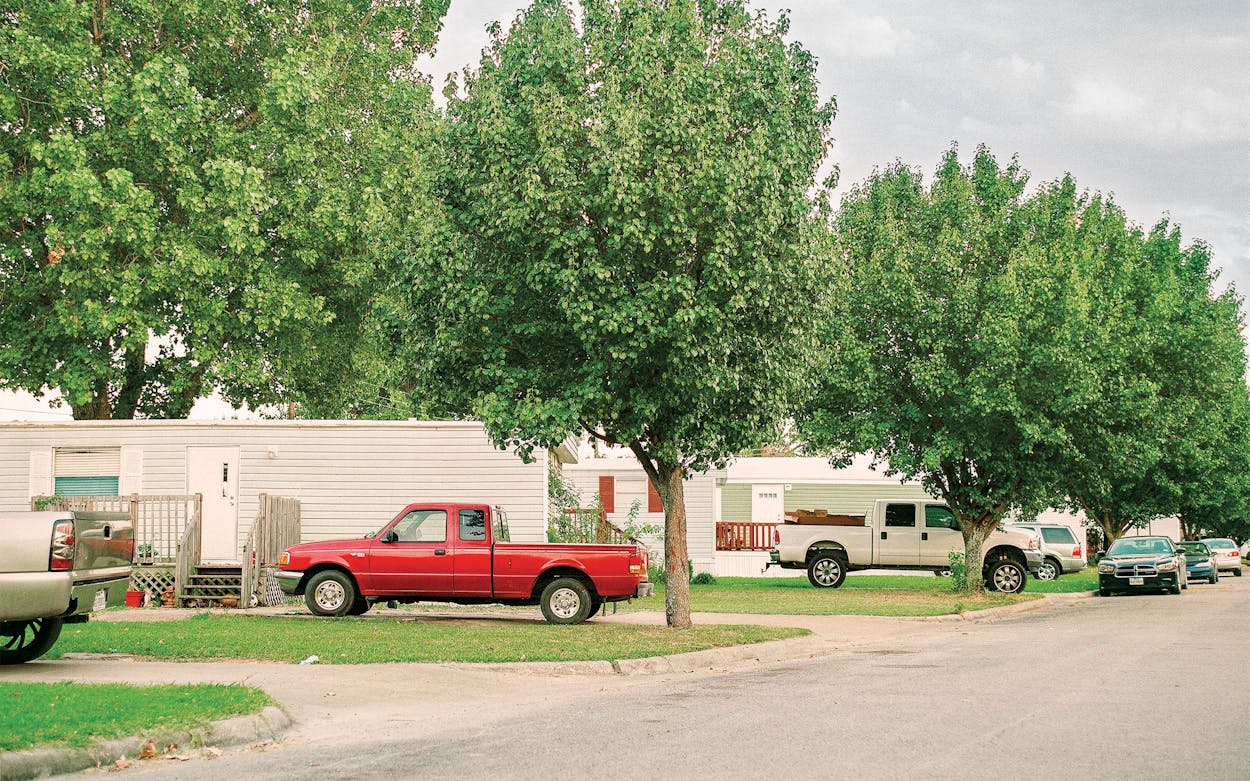You’ll know you’re close to Mobile City when you see the Interstate 30 exit for Fate. A small city in north-central Texas, Fate is a sprawling metropolis compared with its neighbor, whose 187 citizens in a total area of 0.0135 miles give it one of the highest population densities in the state. The turnoff for Mobile City is a gravel road whose dusty mouth appears just beyond the fireworks depot. If you pass the liquor store, you’ve gone too far.
When you arrive, you’ll find sixty mobile homes lining three lanes: Ivey, Lilac, and Rose. The residences are long and narrow and are arranged at an angle, like cars slotted into parking spaces. Although this is a city like no other, the homes are accessorized much like those anywhere else, with flowerpots, wind chimes, grills. Trucks idle along the curb on Ivey.
This is where, on a muggy day in early June, I meet Kenny Phillips. A 65-year-old with a silver ponytail and a boyish grin, Phillips greets me from the front porch of his mobile home, which also happens to be city hall.
Once upon a time, Phillips was the private chef for Alex Rodriguez, in the years when the baseball player was the highest-paid athlete in the nation. When A-Rod left the Rangers for the Yankees, in 2004, Phillips went with him. He cooked for a pre-presidential Donald Trump; he made Coke floats for Warren Buffett. Phillips had a place in Manhattan, a big old spread in the affluent Dallas suburb of Rockwall for the off-season, and a six-figure income. But when A-Rod got divorced, in 2008, he parted ways with the staff his wife had assembled, and Phillips found himself adrift.
He’d built sets for theatrical productions in London in his early twenties, and he knew how to run the kitchen of a five-star restaurant. Phillips was nothing if not versatile, but his cooking years were winding down. He was only in his fifties, but he had back pain despite several surgeries, and he wanted an early retirement. That’s when he got to thinking about Mobile City.

Mobile City was founded in 1990, when Paul Easley and his wife, Billie, then owners of the mobile home park, devised a plan to bring booze to a very dry Rockwall County. Back in those days, a thirsty customer had to drive 25 miles to Dallas for a six-pack of Bud. So the couple incorporated the park, allowing them to legalize and tax alcohol sales. Soon Dallas-based liquor chain Sigel’s Beverages arose in an adjacent lot, transforming life for the humble citizens of Mobile City. They now found themselves in a rather unlikely civic experiment as the only city in Rockwall County (until 2007) to allow retail alcohol sales.
A liquor store, a trailer park—the appeal may not be obvious to some folks, but Phillips liked the freedom and simplicity Mobile City offered after his time among the stars. In 2012, a few years after the Great Recession downshifted many an American dream, Phillips took a tour of the city with leasing agent Dana Lawson, who (owing to the curious customs of a curious place) was also then the mayor.
“What kind of people live out here?” Phillips asked, casting around for a seedy side—he had a wife and two grown sons, as well as a granddaughter he was helping to raise. But the community Lawson described sounded like a utopia. Most residents were members of tight-knit families, quiet and hardworking. They spoke mostly Spanish and Phillips did not, but he figured he’d find ways to communicate. The rent in Mobile City was $650 a month.
He and his wife moved into a three-bedroom mobile home that was sixteen feet wide and forty feet long. Though cramped by McMansion standards, it was a castle next to his first apartment near Times Square, which had reminded Phillips of a closet. The mobile home was laid out in a straight line, like a shotgun house, with a living room, an office, a second bedroom at the end of the hall, and a primary bedroom big enough to fit a king-size bed. He built a porch, where he could kick back on patio furniture while the roar of the nearby highway rose and fell like surf crashing on sand. An old railway ran along the back of the trailer park, and a train passed four times a week, whooshing by loudly enough to vibrate the walls. But Phillips didn’t find the noise that different from the noise in Manhattan.
Life in Mobile City isn’t for everyone. Phillips’s wife, for instance, wasn’t enthused about downsizing, and the couple soon divorced. (It had been coming for a while, Phillips says.) But life in Mobile City was very much for Phillips. Warm neighbors, almost no crime. In the summer, you could hear the kids playing outside. The area was part of the district where his granddaughter went to school. He joined two other people serving on the (very casual) city council. And when Dana Lawson decided to retire, at the end of 2018, she came to Phillips with a plan.
“You’re going to be mayor,” she said.
“I don’t think that’s how it works,” he said, but things operated a little off-kilter in Mobile City. Lawson had not been elected mayor; she was simply appointed (by the former owner of the mobile home park, after the previous mayor passed away), just as she was appointing Phillips. He did take over from Lawson, in January 2019, but he still held an election that May. He ran unopposed.
Sitting on his front porch, with his shaggy gray hair and a beard he’ll shave off once the heat gets to be too much, Phillips looks more like an aging rocker than a small-town mayor. He leans back from a wrought iron table cluttered with cat food, a portable speaker, two old-timey smoking pipes, and a Bic lighter. When his cellphone rings, I hear the sound of the seventies. “Todd Rundgren,” he explains, before turning off the phone.
He leads me inside his home, where city council meetings take place in his breakfast nook, between the bookcase and the refrigerator. An American flag stands in the corner, and framed certificates hang on the wall. When Phillips became mayor, he decided to make some changes. He’s since passed more ordinances in two and a half years than were passed in all thirty years of the city’s history. One ordinance set the speed limit at 15 miles an hour. Another outlawed fireworks in the city after customers of a nearby fireworks depot kept lighting them in the parking lot—the depot is not inside Mobile City, but its parking lot is—and sparks would fall onto the homes. He put the kibosh on the tradition of mayors acting as leasing agents, which he felt was a conflict of interest.
It’s not easy to teach yourself to govern a city. There are not a lot of YouTube tutorials or online master classes, although Phillips took courses with the Texas Municipal League and bought the closest thing on the market to Mayoring for Dummies, a thin brown workbook called the Handbook for Mayors and Councilmembers. But much of what he learned came from hanging out with leaders like Mayor Jim Pruitt and County Judge David Sweet, of Rockwall, and Janet Nichol, a Royse City commissioner who was the mayor of that town for many years.
When he looked over the records, Phillips was startled by the slapdash management. He noticed that some weeks Mobile City had insufficient funds for operations; he was pretty sure cities were supposed to have budgets to keep that from happening. If Phillips was going to be mayor, he was going to do it right. He recruited two women, both single mothers, to serve on the city council, which meets in his trailer the first Tuesday of every month. Each session begins with the Pledge of Allegiance.

Phillips gives me a tour of Mobile City businesses, which does not take long. Sigel’s (which was sold to Austin-based Twin Liquors in 2018) still does a brisk business, selling wholesale to Rockwall restaurants and retail to regulars from the surrounding areas. In March, Houston-based Spec’s moved in not too far down I-30, but a Sigel’s employee tells me the competition hasn’t noticeably slowed the flow of Tito’s and Jack Daniel’s and Jim Beam from the store. Next to Sigel’s is the city’s other business, a popular market called La Victoria Carnicería, which opened about ten years ago and sells meat and produce and canned goods, along with some of the best street tacos around.
We enter La Victoria, passing stacks of fresh tortillas and a display case of Mexican pastries, and head for the lunch counter in back. As I devour a top-notch barbacoa taco, oily red sauce spilling down my fingers, Phillips tells me about a cloud currently hanging over Mobile City. It arrived in 2019, shortly after Phillips took office, when the mobile home park was sold to Dallas-based property management firm Buena Vista Estates.
The company’s arrival shook up the hamlet. (Buena Vista Estates declined requests for an interview. The company’s legal representation did not respond to a request in time for publication.) Water and sewage had always been included in rent, for instance, but sub-meters appeared on each home, and residents struggled to cover the extra cost each month. There were also new fees. One woman said she was fined $150 for feeding stray cats. A man said he came home to find a note slapped on his door: “Effective immediately Buena Vista will no longer supply gas for the community mower . . . This will not be used as an excuse for not keeping your yards mowed.” Phillips said another resident was fined $50 a day for storing a rug on her porch. Not long after Buena Vista took over, residents gathered in the park to discuss the situation. Afterward, there was a city council meeting in which twenty citizens crowded into Phillips’s mobile home. Most such meetings last thirty minutes, but that one took more than two hours. By the end of 2019, nearly twenty of the sixty mobile homes had been vacated.
“This was a pleasant place when it was under a different management,” says James Otis Jr., a 47-year-old single father and master electrician. He’s raised four daughters, including one who is training to be an Olympic gymnast. “This community, we all get along, and the mayor, he’s a great guy. That’s all I can say. When we have issues, he’ll tackle it. There’s nothing that will stop him.”


“People feel stuck,” says one longtime resident, who asked not to be named. She moved to Mobile City because it was safe and affordable. But her monthly payments, for rent plus added fees and fines, have nearly doubled. She explains that many residents, especially those who are undocumented, are reluctant to contest changes.
Buena Vista Estates has filed a lawsuit alleging that Phillips used falsehoods to instigate the mass exit in 2019, a legal mess still unresolved. Phillips denies sharing any falsehoods and says he doesn’t see himself as an instigator; he just wants Mobile City to be a place where anyone can raise their family.
“I’ve never seen an individual care as much as he does,” says Brittany Berry, one of the two city council members. Thirty-year-old Berry describes herself as “the attitude” on the council, since, she says, Phillips is a sweet person who dislikes confrontation. When Phillips approached her, he warned her that it was a volunteer position. Sign me up, she said. She marvels at all the mayor has accomplished during his tenure.
Phillips built a half-court where the teenagers could play basketball. He handed out fire extinguishers to all the residents. He established a community garden where anyone could pick vegetables for free (management has since removed the garden). Now citizens get free meals on Thanksgiving and Christmas, and when I meet him, he’s gearing up for an ambitious Sunday gathering in the park with his church, Rockwall Presbyterian. One parishioner is cooking six hundred tamales, and Phillips is making the street corn, pico de gallo, and beans—he bought the ingredients from La Victoria, naturally.
It’s been raining in North Texas for days and days, but the skies part on June 6 for the big Sunday bash. Two pastors stand at a microphone near a bounce house rented for the occasion, and kids squeal as Marq Toombs gives the sermon in Spanish, Zach Pummill in English. About 130 attendees, 100 from the Rockwall church and 30 from Mobile City—a successful turnout, by Phillips’s measure—sit in folding chairs under the shade of a cottonwood tree shedding little puffs of white that occasionally float across the horizon.
The sermon is about fellowship. “Who is someone you would die for?” asks Pummill. I am distressed to find no names come to mind. My parents and older brother would kill me if I sacrificed my life for theirs. I am thoroughly twenty-first century in the way I’ve remained unattached into my forties: no husband, no kids. I’ve lived for stints in Ecuador and Austin and New York City, but what holds true about all these places is that I’ve rarely known my neighbors. Kids shift in their parents’ laps, and audience members fan themselves with programs as I stare at the soggy, clover-covered ground, thinking of the ways I have avoided the very attachments that might root me. My eyes mist up at such a simple display of community.
After the sermon, we line up for the feast. The bounty accumulates, tricky to balance on my plate: a pork tamale, a bean-and-cheese tamale, rice and beans, a brownie, a square of key lime pie. I sit with Berry. With her cool oversized sunglasses and an intricate tattoo of a girl on a swing decorating each thigh, she doesn’t look like a civil servant.

Berry grew up outside Los Angeles, but her parents moved to Rockwall when she was a teen, and she came to Mobile City five years ago after a friend, also a single mom, recommended it. This place was like Pleasantville, she says—at least before the new management took over. One of her neighbors mows her lawn, out of the goodness of his heart. Another neighbor brings her pupusas each week.
By 8 p.m., teens have crashed the bounce house, and little ones squeal as they get knocked around the inflatable walls: time to go home. Phillips is tired but beaming. Someone asks if they’re gonna start doing this every week. Phillips laughs. Maybe! At least, they might do this more often.
Phillips wonders all the time, how do you bring people together? How do you keep them connected and safe? His brain is always trying to solve the riddle of what folks need. A light, an appliance, help with an air conditioner. He often worries about what will happen if a tornado hits. His dream is to build a shelter on-site so that if some twister leaves nothing but debris and toothpicks, those who call Mobile City home will be protected.
A tornado came close in 2019. Phillips watched the sky from his porch. This was against protocol; he was supposed to seek shelter in the emergency facilities in Rockwall, but he couldn’t bring himself to leave.
Phillips knows that if fate comes for Mobile City, he wants to be the person calling out for everybody. Where’s Jesús? Where’s Johnny? Where’s Rebecca? He wants his people to know they matter, that someone is looking out for them.
Sarah Hepola lives in Dallas. She is the author of Blackout: Remembering the Things I Drank to Forget.
This article originally appeared in the August 2021 issue of Texas Monthly with the headline “Where Everybody Knows Your Name.” Subscribe today.







